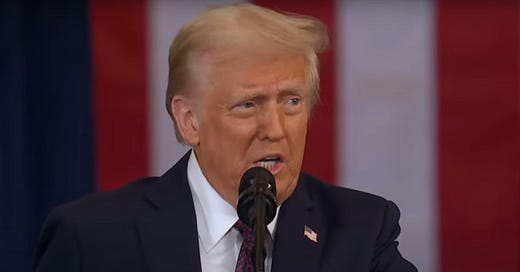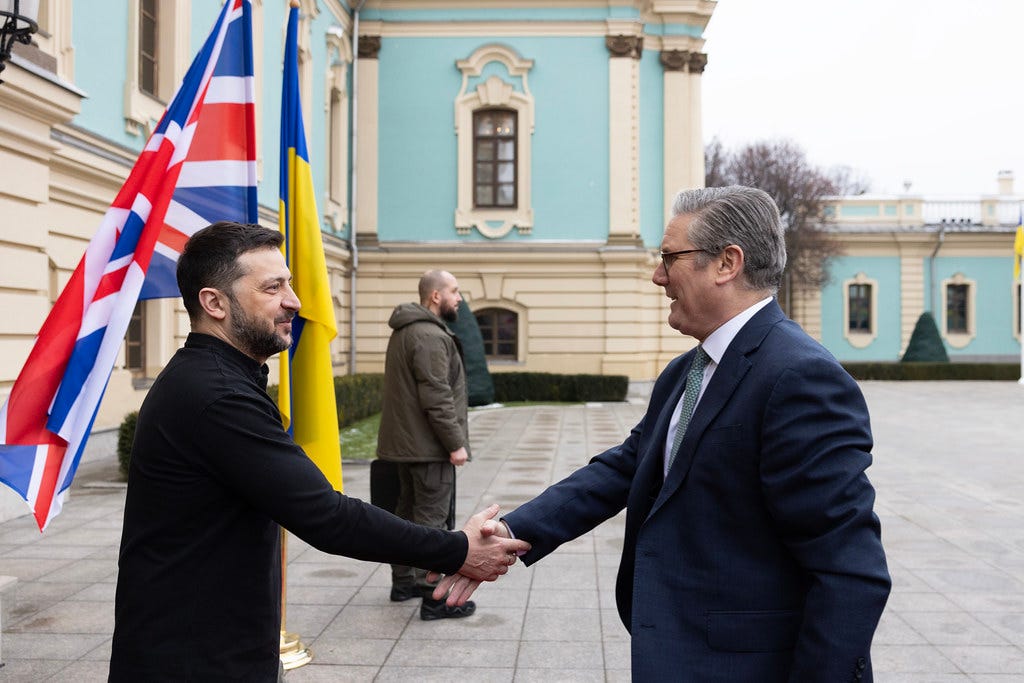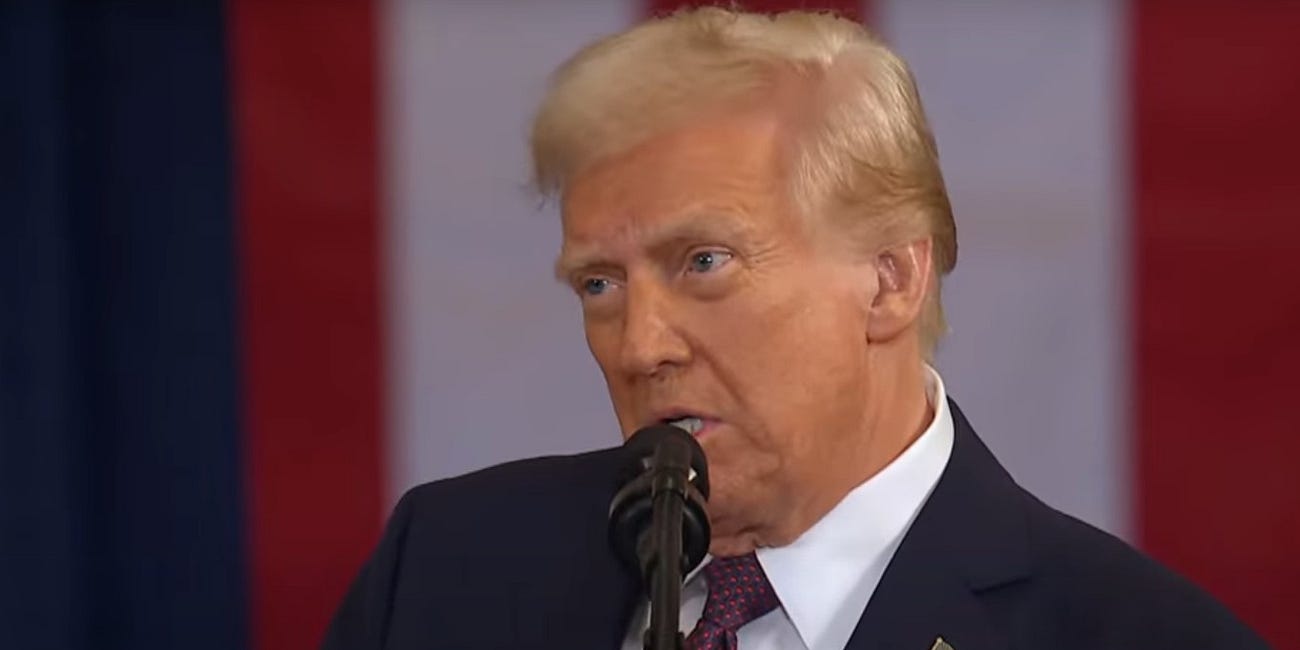The permanent migraine of Donald Trump
What we should be concerned about when it comes to a Trump presidency and what it means for Starmer and the government here
Donald Trump’s presidency is not so much a headache for the Labour government, but a permanent migraine.
Beyond Trump’s unrestrained version of chauvinistic populism—which will undoubtedly test the centre-left government’s values—his economic and foreign policies could torpedo the UK’s plans for growth and threaten national security.
So what should we be concerned about when it comes to the US presidency - and what, if anything can Keir Starmer do to prepare?
The first and most immediate concern is the potential introduction of tariffs. Pre-election, Trump made promises to impose a 60 per cent tariff on goods from China and up to 20 per cent on imports from other countries, much to the dismay of the entire global order.
While the UK government is optimistic that any tariffs won’t directly target British exports, the broader impact on markets remains a significant worry. Given the UK's dependence on the global economy, reactionary tariffs could lead to inflation across international supply chains. Not so good for a government staking everything on putting more money back in the pockets of working people.
Trump’s unpredictability, and increasing hostility to the UK, have set hares running.
Today, at the Institute for Government’s annual conference, Mark Landler, London Bureau Chief at The New York Times, cautioned against playing down Trump’s protectionist threats: “Remember, if you look at Trump's political career – going all the way back to when he first showed interest in politics – he has only ideologically been wedded to a couple of issues, and one of them is the use of protectionism to restore American manufacturing and to right what he sees as a rigged system that has ripped off the United States for decades”, he explained. “So I'd be very concerned if I were Europe. I do not believe, by any stretch, that this threat has passed.”
Dr. Leslie Vinjamuri, Director of the US and Americas Programme at Chatham House also warned that Trump’s policies could change at the flick of a switch:
“As soon as Trump takes exception with a broader policy conversation [..] whether this is about the UK not stepping up to a higher level of defense spending fast enough, or not aligning on whatever the China policy it’s developed in the months ahead[…] Any one of those decisions taken by the UK could lead to the use of tariffs, as in effect a sanction, punishment or a condition.”
Trump’s foreign policy will also test Labour. Successive UK governments have firmly backed Ukraine in its war against Russian aggression. However, Trump has suggested resolving the conflict through a deal between the nations, which many fear could involve territorial concessions from Ukraine.
Then there is Trump’s history of hostility toward NATO—threatening to withdraw unless other nations increased defence spending— which has raised concerns about the alliance's future. With the UK’s commitment to 2.5 per cent of GDP for defence still a distant goal, Trump’s return could permanently reshape global alliances - and leave the UK exposed.
On the domestic front, Trump will test the government’s resolve. Where Starmer is managerial, pragmatic, and restrained (some may say, a little dull), Trump is brash, ideological, and unpredictable - to put it mildly. And while Labour champions progressive realism—advocating values like environmental protection, human rights, and international collaboration, while recognising the need to engage with less savoury global actors – the new US president is likely to stretch this balancing act to its limits.
Trump’s alt-right ally Elon Musk has used his social media platform X to launch countless attacks on Starmer, while Trump’s team continue to undermine Labour’s Foreign Secretary and Ambassador-designate Peter Mandelson. Trump’s protectionism, anti-immigrant rhetoric and validation of alt-right figures starkly contrast Labour’s core principles.
Nigel Farage further complicates matters. Farage’s close ties to Trump and his rising influence through Reform UK could hinder the government’s efforts to maintain stability.
While direct US interference in UK politics is unprecedented, Farage’s influence over Trump - and Reform UK’s mirroring of MAGA strategy - poses significant risks, allowing Farage to bolster his profile and find new ways to undermine UK-US relations.
As Landler put it: “I think it's just going to be extremely difficult for this government to avoid being undercut—not just by people in the US that have their own agenda, but by people in the UK that have an agenda that involves undermining the government.”
So how can Labour navigate the looming despot and his band of merry men?
Firstly, Trump’s unpredictability demands preparation - but also patience. His aggressive stance on tariffs may well be more posturing than policy, aimed at boosting the US economy. Moreover, Trump’s personal fondness for the UK—rooted in admiration for its traditions, institutions and golf courses —could shield Britain from some of his harsher measures.
Secondly, the UK must strengthen global alliances. Trade with the EU, the UK’s largest trading partner, is vital. In 2023, the UK exported £185 billion in goods to the EU, more than three times that exported to the US. With the EU facing similar threats, closer UK-EU cooperation could mitigate both economic risks and defence concerns.
Finally, though diplomacy is key, so is integrity. While Trump may thrive on flattery, the UK must prioritise its values and the interests of its people. Trump is ultimately a businessman. While he is driven by ego, he respects strength and mocks weakness. Kowtowing to a bully only weakens our hand.
And, as Landler suggests, the Royal Family could play a significant role in thawing relations and calming nerves:
“They need to send Prince William, the King and Camilla, and everyone who's willing to go to Washington, as soon as possible. And I think this is a chance for the Royal Family to play a diplomatic role. It's arguably more significant than they've had in quite a long time.”
So: If all else fails, deploy the King and his novelty ties. Never underestimate the international currency of a royal tea party.
About the author: Zoë Grünewald is Westminster Editor at The Lead and a freelance political journalist and broadcaster. She has worked in and around Westminster for five years, starting her career as a parliamentary clerk before throwing away the wig and entering journalism. Zoë then worked as a policy and politics reporter at the New Statesman, before joining the Independent as a political correspondent. When not writing about politics and policy, she is a regular commentator on TV and radio and a panellist on the Oh God What Now podcast.
You can receive Zoe’s insightful writing on all things UK politics - see her recent pieces on the tide turning on Brexit and what 2025 holds for Starmer - direct to you inbox with The Lead, become a paid subscriber below and support our mission to bring you our three-times-a-week newsletter packed with great writing beyond the usual headlines.
What we learned from Trump’s speech
With wall-to-wall coverage across the globe, there was plenty of noise - but underneath all that what did Trump’s words during the oath-taking actually tell us?
We look at six key themes which emerged from migration being a defining issue, culture wars intensify and the escalation of the 'external revenue service' and the threat of more trade tariffs.
Donald Trump's inauguration speech: Six themes which emerged
Attempting to make sense of a Donald Trump speech is an inherently futile exercise, like spending your time pointing out all the ways that pro wrestling is a choreographed performance and not a 'real sport'.
The Lead reads… [on Trump]
Some of our favourite and interesting reads and takes on all things Trump we’ve spotted across the web and socials and worth your time for a read, watch or listen.
Elon Musk’s apparently far-right tinged salute has been setting social media ablaze, Tim Dickinson in Rolling Stone digs into how the far-right appear to be celebrating his gesture.
Trump’s made a big play of ‘getting things done’, but what’s actually in there? The BBC detail the executive orders he’s signed as he’s taken office. From withdrawing the US from the World Health Organisation to creating a new ‘Department of Government Efficiency - Doge - due to be led by Elon Musk.
As we alluded to in our piece above, ‘culture wars’ will intensify as Trump regains office. Amelia Hansford, reports in PinkNews on research by LGBTQ+ non-profit GLAAD in its accountability tracker how Trump has attacked LGBTQ+ people more than 200 times since his last presidency.
While the debate over working from home continues to rage here in the UK, Trump in his new orders has ordered all Federal workers back to the office - Mark Swanson reports in Newsmax.
Always a good watch, Jon Stewart on The Daily Show is always on point - talking about Trump ‘returning to the scene of the crime’.
Bezos, Musk and Zuckerberg. Bernie Sanders called out how the billionaire class controls the government. And Alejandro Tauber in EUObserver picks up on the chilling sight of the ‘tech bros’ being on the front line yesterday and what you can do about it. Including sign up to newsletters, like The Lead, to ensure you’re informed directly rather than relying on their algorithms.
Aslak Berg writes in the Centre for European Reform about how the UK can ride out Trump when it comes to trade. Saying there will be less disruption than many fear.
We hope you’ve enjoyed this Trump-focused edition and working to make sense of it all. We’ll be back in your inbox on Thursday with our next edition. We hope your week is starting well and feedback is always welcome, ed@thelead.uk if you think there’s something we should be looking into.
Ed, Zoë, Luke, Sophie, Natalie and all at The Lead








